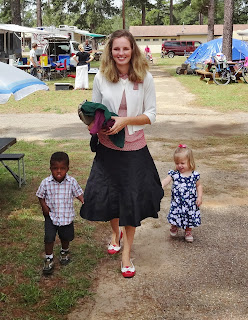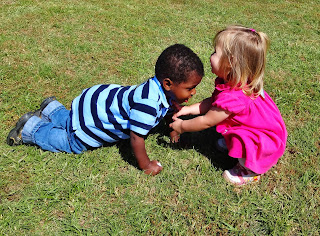Once upon a time there was a woman. She loved her husband
dearly and loved living in her city but was very wicked. She was full of envy,
strife, hate and pride. She committed many crimes against her husband and King.
Her husband loved her despite her behavior, even when she was very hard to
love, but he had to tell the King about her wickedness. So the King came to
her. He said, “Woman you are very wicked and have committed many crimes against
Me and My kingdom, your penalty is death.” The woman cried out to the king, she
was pierced at the heart and saw herself for what she had become. “Oh my King,
please have mercy on me!” The King was moved with compassion for her and said,
“I am a just and good King, I cannot let criminals go without their penalty
being paid, but this is what I will do, because I love you so, I will adopt you
as My own and give you My power and kingdom, and I will send My perfect,
blameless Son, the Prince of Peace, to die in your place and in the place of all criminals who enter my kingdom.” The woman with
tear-filled eyes looked at her beloved King as he gave His only Son for her and
gave her all he had and made her his daughter. “Lord I am not worthy, I deserve
none of this.” The King responded only with, “I will look at you now, not as
condemned, but as perfect. Obey what My Son and I have written and love and
serve My people!”
Her husband rejoiced when he heard
what their great King had done for his wife and they committed their lives to
serving the Son who paid for their great crimes. The woman began reading all
that had been written in the Kingdom. One day, she read, “care for the
orphaned,” and her heart was pierced. Their King had adopted her as His very
own when she was in need, how could they not follow their King’s great example
and adopt others in need? They studied and learned all they could from the King
and His love for them spurred on their compassion for others. Even when great
obstacles were encountered, when paperwork piled high, when schedules had to be
arranged for endless appointments and interviews seemed endless their King
reminded them, “You can do all things when I am your strength.” And the King
walked with them as their guide.
The day arrived when the command to
care became a reality. Three orphaned, needy children showed up on their
doorstep. They thought how complete their lives were now that they had begun to
fulfill their purpose. How excited they were to reflect the great King’s love
to these hurting, broken children. But problems arose. These small, sweet-faced
orphans were desperately wicked. Every morning she would have to beg and plead
and fight that they shower and just brush their teeth and hair. After searching
for and finding the urine soaked items that were hidden she would pack lunches,
backpacks, find lost socks and shoes, and missing homework. She would answer incessant,
nonsense questions about the obvious. The woman would get them off to school then
go to work tired and ready for a break. She would get a call. A child was sick,
or refused to do their schoolwork, or comply with their teacher’s requests or
had been sent out of class due to being a disruption. Weary she would go to the
school to talk about a way to fix the problem. When school was over there was counseling
and doctor appointments and visitations. She would begin to make dinner but
have to stop several times to break up fights, to answer more nonsense questions,
to help with homework, to beg them to do their homework, and correct or send
them away when they refused. When dinner was ready and her husband walked in
the door she would melt into his arms. “I am weak, I forget why I am caring for
these children.”
“Oh Sweetie, don’t you remember the
words of the king? ‘Come to me all you who are weak and weary and I will give
you rest’.” The husband held her tight and they tried to enjoy their meals
together despite the gagging, crying, refusing to eat or the children fighting
for attention, falling out of chairs, chattering on about nothing just to hog
the conversation and heavy critique of anything that was on their plate. They
followed their task parenting these little ones even with the belligerent
attitudes that followed dinner, with the somber face that refused to take part
in any fun of a new family, and even with the constant manipulations to gain
what they wanted when they wanted it. Then came the nightly routine of begging
and pleading and fighting that they just please get dressed, brush their teeth or
go to bed, the never enough stories or songs, the twenty times someone had to
get back up to pee or get a book or forgot to put a paper away or needed to ask
something of no importance.
Although the daily marathon continued
the woman would just pray, cry and be strengthened by the King’s guidance to
endure the trials each day held. The woman was struggling when another orphan was
left on the doorstep, a baby, so sweet, so beautiful. She looked at this sweet baby,
so helpless and remembered why she wanted to care for these little ones. In a
moment, she had a renewed view of the mission.
But the crying never stopped. The
baby could not be consoled, not when being held, not in the car, not with noise
or quiet. The door slams, again. Another runaway. Another phone call to the
police, “Yes officer, that house, that child, yes again.” The woman’s head
drops in exhaustion, "Why am I doing this?" The husband comes home early from
work again. Another incident, another theft, always something new going
missing, always something new is found hidden, then the lies. The lies just
pour out like water from a well, completely natural. The constant smell of
urine led to so many searches, so many hidden, putrid items found, more
vandalism, another angry outburst, another refusal to eat, another runaway, the
endless movement and chattering, so many needs and questions, now another visit
with the principal, another doctor’s visit, another endless day of crying. It
was too much. The woman was tired. The husband was tired.
More writing on the wall, it was the
last straw, we told the child this time we will take the markers. The child
stood with the markers behind her, “Sweetie, I told you if you drew on the wall
again I will have to take your markers.” The woman’s face stung in pain. The
child smiled, “Go ahead, hit me back.” One phone call, the woman had to make
one phone call and they would come take this wicked orphan away. The woman made
that call.
That night a burden heavier than
caring for these children weighed on her. She remembered the King. She
remembered how wicked she had been and how all her wickedness was paid and
forgiven by the payment of the Son’s life. How could she not love this child
the way the King had loved her? What made it so hard? The woman vowed to love
these orphans sent to her, vowed that no matter what they did, no matter how
tired she was, she would continue in love to serve her King.
In just a moment, with the whirlwind
this journey has already brought, now there is another orphan on the doorstep.
A baby. This baby didn’t cry. This baby didn’t crawl. This baby didn’t smile or
laugh. This baby didn’t move his hands to play with a toy or pick up food. This
baby just sat. This baby would stare and study faces as he drank his bottle. So
different than the other baby that cried constantly. So different than the
children that chattered and moved and ran constantly. The woman fell deeply in
love with the quiet, easy baby.
The quiet baby eventually stopped
being quiet, but still never cried. He laughed all the time and smiled. He
would light up a room with his joy and applaud the woman when she came in. The
woman couldn’t help but smile when she was around him. It felt like a glimmer
of hope and joy in her very tired, dark world. The woman worked and prepared
five little ones every day, the woman armored up for the fights and battles,
she did her best to guard them against themselves so they could not devise evil and lie and
plunder. The woman held them and told them the difference between evil and
good. She showed them mercy and pronounced them free, although they deserved punishment for their
deeds, she passed on the stories and gifts of her good and gracious King. The
woman also failed daily, sought forgiveness and asked the King many times, “O King you know my
heart, are you sure you chose correctly, did you truly choose me to care for
these orphans? In all Your kingdom, You must have one more skilled, more
loving, more obedient than I?” The King smiled as He whispered back to her, “I
choose the weak to shame the strong, any good work I have began with you I will
bring to completion.”
Some days began to pass without a
battle. Some days began to fill with joy, to even overflow with joy. The woman
began to feel happy and want to hug and love. Then the day came when she got to
mimic her King and she adopted all five of these needy orphans into her
heritage and all her possessions and the kingdom her King gave to her.
I wished I could now write: The End, happy ending, but the
woman did not get a break from her tiresome work and the woman’s children did
not become perfect, they had hearts trained in wickedness. The battles did
become fewer and less frequent but more massive in size. The woman often felt exhausted and like a failure, but the woman and her
children did have one hope, a Savior, one to pay for their crimes, for their
wickedness. Both the woman and her children needed strength to overcome the
battles that did and would arise, they needed to rely on the
One Good King who had provided a Savior, His very own perfect Son, Jesus Christ.
Posted by Shannon
Soli Deo gloria - Glory to God alone

























